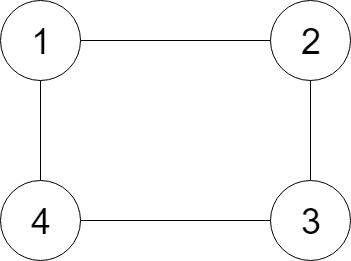https://leetcode.com/problems/clone-graph/
Given a reference of a node in a connected undirected graph, return a deep copy (clone) of the graph. Each node in the graph contains a val (int) and a list (List[Node]) of its neighbors.
Example:
Input:
{"$id":"1","neighbors":[{"$id":"2","neighbors":[{"$ref":"1"},{"$id":"3","neighbors":[{"$ref":"2"},{"$id":"4","neighbors":[{"$ref":"3"},{"$ref":"1"}],"val":4}],"val":3}],"val":2},{"$ref":"4"}],"val":1}
Explanation:
Node 1's value is 1, and it has two neighbors: Node 2 and 4.
Node 2's value is 2, and it has two neighbors: Node 1 and 3.
Node 3's value is 3, and it has two neighbors: Node 2 and 4.
Node 4's value is 4, and it has two neighbors: Node 1 and 3.
Note:
- The number of nodes will be between 1 and 100.
- The undirected graph is a simple graph, which means no repeated edges and no self-loops in the graph.
- Since the graph is undirected, if node p has node q as neighbor, then node q must have node p as neighbor too.
- You must return the copy of the given node as a reference to the cloned graph.
- Accepted
- 211,208
- Submissions
- 809,003
- The graph is not null
- The graph may have cycles
- Do a breadth-first search on each original node to copy every single one of them
- Each time when we are copying a node, generate all its neighbors and copy them as well
- Use a HashMap to store the <original node, generated node for copy> relationship
- Every time when a node is being copy, check if it has already been generated before
- If it has, use the generated copy of it
- If not, generate a copy of this node and use it to copy
- Do the same for the node's neighbors
- If the neighbor has not been generated before
- Generate a new copy of it
- Offer the neighbor to the queue
- The queue should only contain the nodes that have not been copied
- If the neighbor has not been generated before
- Every time when a node is being copy, check if it has already been generated before
/*
// Definition for a Node.
class Node {
public int val;
public List<Node> neighbors;
public Node() {}
public Node(int _val,List<Node> _neighbors) {
val = _val;
neighbors = _neighbors;
}
};
*/
class Solution {
public Node cloneGraph(Node node) {
if (node == null) {
return node;
}
// The map "generated" keeps track of the
// <original node, generated copy> relationship
Map<Node, Node> generated = new HashMap<>();
// Start from the first node, use a FIFO queue,
// expand the current node's neighbors. Copy all neighbors
// and offer them to the queue
// Terminate when the queue becomes empty
Queue<Node> queue = new ArrayDeque<>();
queue.offer(node);
while (!queue.isEmpty()) {
Node current = queue.poll();
// Get the generated copy of this node
if (!generated.containsKey(current)) {
generated.put(current, new Node(current.val, new ArrayList<>()));
}
Node copyNode = generated.get(current);
// Expand and generate all its neighbors
for (Node neighbor : current.neighbors) {
// Skip the node if it has been generated
if (!generated.containsKey(neighbor)) {
generated.put(neighbor, new Node(neighbor.val, new ArrayList<>()));
queue.offer(neighbor);
}
Node copyNeighbor = generated.get(neighbor);
copyNode.neighbors.add(copyNeighbor);
// queue.offer(neighbor);
}
}
return generated.get(node);
}
}- Time
- The nodes will be generated for copy exactly once
- Total time is O(n)
- Space
- The HashMap takes O(n) space
- Total space is O(n)
